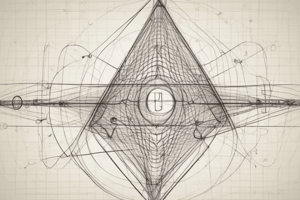Podcast
Questions and Answers
What does it mean to justify in mathematical terms?
What does it mean to justify in mathematical terms?
A postulate or theorem which enables a conclusion to be drawn.
What is a quadratic equation?
What is a quadratic equation?
An equation where the highest exponent of the variable is 2, usually written as ax^2 + bx + c = 0.
What is the standard form of a quadratic equation?
What is the standard form of a quadratic equation?
y = ax^2 + bx + c, where a, b, and c are numbers and a cannot be 0.
What is an imaginary number?
What is an imaginary number?
Define a complex number.
Define a complex number.
What is a complex conjugate?
What is a complex conjugate?
What does completing the square involve?
What does completing the square involve?
What is the discriminant in a quadratic equation?
What is the discriminant in a quadratic equation?
What is a root of a number?
What is a root of a number?
What does zero represent in a mathematical context?
What does zero represent in a mathematical context?
Flashcards are hidden until you start studying
Study Notes
Vocabulary and Definitions
-
Justify: Postulate or theorem allowing a conclusion to be drawn; used in mathematical proofs to support statements.
-
Quadratic Equation: An equation where the variable's highest exponent is 2; standard form is ax² + bx + c = 0, e.g., 2x² + 5x - 3 = 0.
-
Standard Form of a Quadratic Equation: An equation of degree 2 written as y = ax² + bx + c; 'a', 'b', and 'c' are constants, with 'a' not equal to 0.
-
Imaginary Number: A number yielding a negative result when squared; represented as √(-1) denoted by 'i' or 'j'.
-
Complex Number: Can be expressed as a + bi, where 'a' and 'b' are real numbers and 'i' is the imaginary unit, satisfying i² = -1.
-
Complex Conjugate: The number with the same real part as a complex number but with an opposite imaginary part; e.g., the conjugate of 3 + 4i is 3 - 4i.
-
Completing the Square: A method to solve quadratic equations, graph functions, and evaluate integrals; useful when factoring is impractical or to find irrational and complex roots.
-
Discriminant: Calculated as D = b² - 4ac from the coefficients of ax² + bx + c = 0; indicates the number and type of roots of the quadratic equation.
-
Root: A number which, when multiplied by itself a specified number of times, equals a given number; the square root of 9 is 3 (3 x 3 = 9).
-
Zero: A value representing a null quantity; the concept often illustrated through pairs such as +1 and -1 that sum to zero, often used in arithmetic problems involving positive and negative integers.
Studying That Suits You
Use AI to generate personalized quizzes and flashcards to suit your learning preferences.




